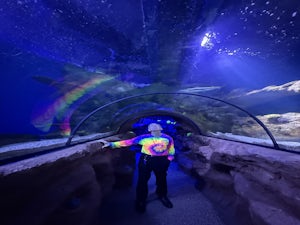For years, Paul’s days followed a quiet and familiar rhythm. Each morning, one of his carers would arrive to help him start the day, a three-hour visit filled with care, conversation, and a few light hearted moments. Later came his short tea and evening calls, ensuring he remained comfortable and supported in his home in Bury St Edmunds.
While Paul’s physical and personal care needs were met, something deeper was missing. Over time, he began to confide in his carers that he felt “stuck” hemmed in by the same four walls and the same routine. Though surrounded by kindness, he missed being part of the world beyond his doorstep. Paul had always been an inquisitive man with a love of history, nature and meaningful conversation, but his mobility challenges and the confidence he’d slowly lost made it difficult to go anywhere new.
During one of his regular reviews, Paul shared a simple but heartfelt wish: he wanted to travel again. To visit places of interest, to learn, to see, to feel the buzz of life happening around him. He said,
“I just want to have something to look forward to something different to talk about.”
Recognising the importance of this request, his care coordinator took action. Together, they explored how Paul could safely enjoy trips further afield while continuing to receive the support he needed. A detailed proposal was submitted to Social Services, outlining how monthly, full-day community outings could improve Paul’s wellbeing, promoting independence, social inclusion, and emotional fulfilment.
After careful consideration, the funding was approved: an additional eight-hour support block each month dedicated to community-based activities.
With renewed enthusiasm, Paul and his care team began planning. Each outing was carefully chosen to reflect his interests and comfort level. From accessibility and transport to meal arrangements, every detail was considered. Soon, Paul found himself on his first trip — a long-awaited visit to the Imperial War Museum Duxford, a place he had always dreamed of exploring. Standing before the aircraft displays, he was visibly moved.
“It’s wonderful to see all this history up close,”
he said, his eyes lighting up.
Since then, Paul has enjoyed several memorable excursions, including a seaside visit to the Great Yarmouth Sea Life Centre. These days out have done more than offer entertainment — they have reignited his sense of purpose and connection.
After each trip, Paul returns home feeling “revitalised.” He eagerly shares his experiences with carers and family, often recounting small moments of joy — the smell of the sea air, the laughter of children nearby, the pleasure of a cup of tea in a new place. His carers have noticed a remarkable transformation: his confidence has grown, his mood has lifted and he now takes an active role in planning future adventures.
Paul’s story is a reminder that care is not only about meeting basic needs, it’s about nurturing the heart and mind as well. By listening, collaborating and thinking beyond routine, the team helped Paul rediscover his independence, his curiosity and, most importantly, his joy in life.





















